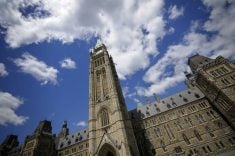By Reuters and Western Producer Staff
Japan hiked tariffs on frozen beef imports from Canada, the United States and other counties on Friday.
The tariff rises to 50 percent from 38.5 percent, until next March, Japan’s Ministry of Finance said.
The tariff hike is a “safeguard” mechanism to protect domestic farmers, Japan’s ministry said. It is the first time it has been triggered since 2003 when it applied to chilled beef, the farm ministry said.
An increase is automatic if quarterly imports of specific beef products – both from all nations and from those lacking economic partnership agreements (EPAs) with Japan – rise more than 17 percent from a year earlier.
Read Also

U.S. livestock: Cattle fall back, hogs continue slide
Chicago cattle futures fell back on Tuesday. Hogs continued to slide. Most-active December live cattle futures closed at 227.775 cents…
In April-June, Japan’s first fiscal quarter, frozen beef imports from all nations, at 89,253 tonnes, were up 17.1 percent on the year, while imports from non-EPA nations reached 37,823 tonnes, an increase of nearly a quarter, government data showed.
Nations that have EPAs with Japan, such as Australia, Mexico and Chile, escape the tariff hike.
Canada sold C$45 million of frozen boneless beef in 2016 to Japan. It also sold $16 million of frozen offal and tongues.
Total Canadian beef and veal exports to Japan to May of this year total just over $60 million, an increase of 24 percent.
Japan is the top destination for U.S. chilled and frozen beef, with trade valued at US$581 million this year through May. Exports of chilled beef from the United States to Japan totaled 57,970 tonnes during that period and frozen beef exports were 44,760 tonnes – valued at $414.4 million and $166.7 million, respectively, according to U.S. Meat Export Federation data.
U.S. Agriculture Secretary Sonny Perdue said the higher tariff could disrupt sales and harm trade relations between the U.S. and Japan.
“I am concerned that an increase in Japan’s tariff on frozen beef imports will impede U.S. beef sales and is likely to increase the United States’ overall trade deficit with Japan,” Perdue said in a statement. “This would harm our important bilateral trade relationship with Japan on agricultural products.”
Tyson Foods Inc, the largest meat processor in the United States, said on Friday it supported U.S. government efforts to address the issue with Japan.
The tariff hike comes as the U.S. beef industry is expecting an increase in supplies, according to two recent U.S. Department of Agriculture reports.
“U.S. beef needs all the demand it can get,” said John Nalivka, president of industry research firm Sterling Marketing.
The expected ample U.S. beef supplies could mean export prices fall to compensate for the increased tariffs or demand could switch to chilled beef imports.
Among the countries not affected by the tariff increase are Australia and Mexico because they have economic partnership agreements with Japan.
Australia could still struggle to win market share as its prices remain high because of a drought that has cut cattle numbers, said Nalivka, who added that a weaker U.S. dollar could help offset the tariff increase.
Mexico sends about 2.7 percent of its total exports to Japan, mostly frozen beef, and could take advantage of the tariffs to boost that.
“This does present an opportunity for Mexico,” said Rogelio Perez, the top trade official with Mexican cattle growers association AMEG.
Any new beef exports to Japan from Mexico, however, would not occur until at least September.














